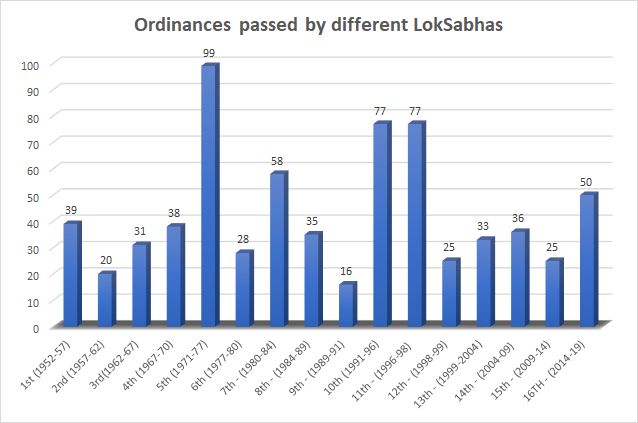What is an ordinance – is a temporary law made by the President of India on the advice of the central government when Parliament is not in session. An ordinance becomes a permanent Act (the law of the land) on being approved by Parliament within six weeks of reassembly.
When is an ordinance justified – According to the framers of the Constitution, the fundamental reason for bestowing the executive with the power to issue ordinance was “to deal with situations where an emergency in the country necessitated urgent action.”
Distribution of powers between Centre and State has to be respected: An ordinance may be concerned with any subject that the Parliament has the power to legislate on and also has the same limitations as the Parliament to legislate according to the distribution of powers between the Union, State and Concurrent Lists.
There are certain limitations with regard to the ordinance making power of the executive.
- The President can only promulgate an ordinance when either of the two Houses of Parliament is not in session.
- The President cannot promulgate an ordinance unless he/she is satisfied that there are circumstances that require taking ‘immediate action’.
- Ordinances must be approved by Parliament within six weeks of reassembling or they shall cease to operate.
- They will also cease to operate in case resolutions disapproving the ordinance are passed by both the Houses.
Do other countries have provisions similar – There are only three parliamentary democracies in the world that permit the ordinance route — India, Pakistan and Bangladesh. The practice in India was adopted from the Government of India Act, 1935, where the viceroy could do as he pleased. In every other country, Parliament has to be convened in order to get a law passed.
When ordinances are frequently issued and re-issued, it violates the spirit of the Constitution resulting in an ‘ordinance raj’.
In the 1986 Supreme Court judgment of D.C. Wadhwa vs. State of Bihar, where the court was examining a case where a state government (under the authority of the Governor) continued to re-promulgate Ordinances, the Constitution Bench headed by Chief Justice P.N. Bhagwati observed: “The power to promulgate an Ordinance is essentially a power to be used to meet an extraordinary situation and it cannot be allowed to be “perverted to serve political ends”. It is contrary to all democratic norms that the Executive should have the power to make a law, but in order to meet an emergent situation, this power is conferred on the Governor and an Ordinance issued by the Governor in exercise of this power must, therefore, of necessity be limited in point of time.”
So what did the Constitution drafting committee think about the Ordinance: https://www.constitutionofindia.net/constitution_of_india/the_union/articles/Article%20123
Ordinances issued by different LokSabha’s




